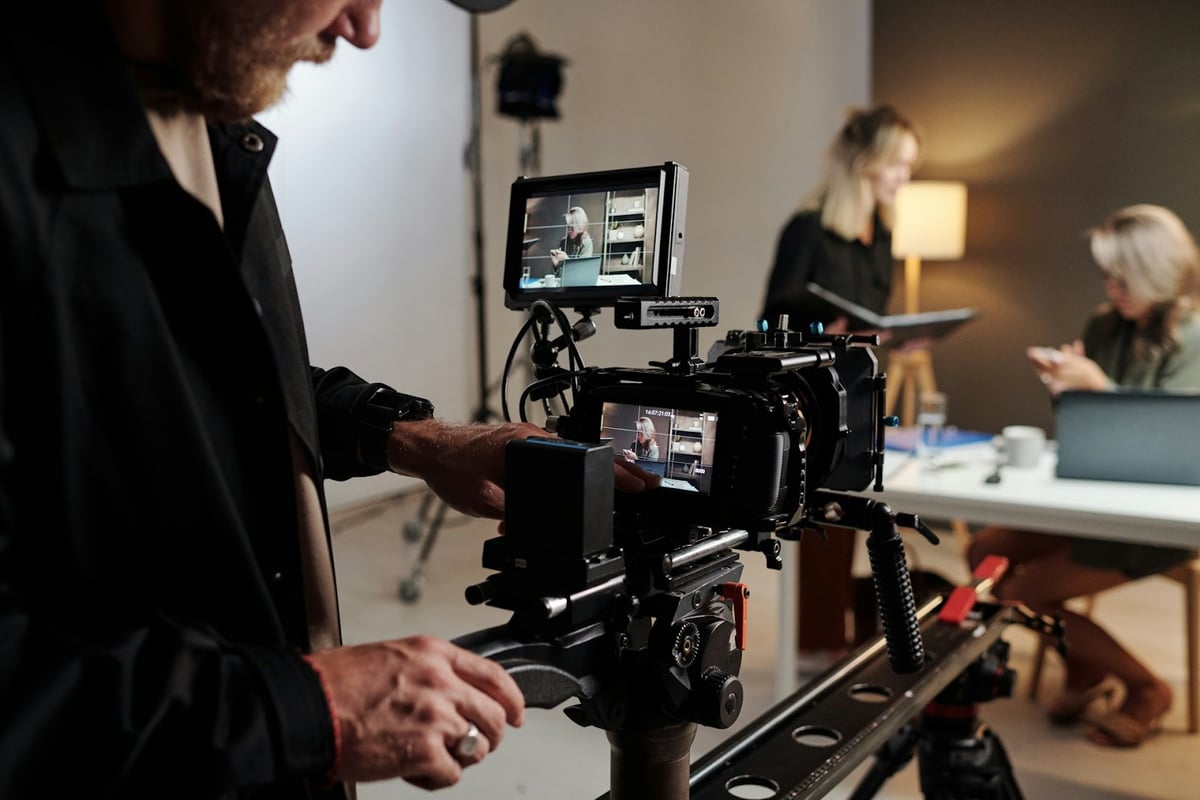You've mastered the technical side of things, but there's something missing. Maybe it's the urge to create something beautiful, to solve problems through visual storytelling, or to build experiences that make people actually feel something.
Here's the good news: you don't have to choose between a fat paycheck and creative fulfillment.
The creative tech industry is exploding, and professionals who can bridge technical expertise with creative vision are commanding premium salaries. We're talking about careers where your analytical thinking enhances your creativity, not limits it.
Ready to explore 21 creative careers that'll let you flex both sides of your brain while padding your bank account? Let's dive in.
Why tech professionals are perfect for creative careers
Before we jump into the careers, here's why you're already ahead of the game:
- You think systematically - Creative work isn't just about inspiration; it's about process, iteration, and problem-solving. Your debugging mindset translates perfectly to design thinking.
- You understand users - Whether it's writing clean code or designing interfaces, you already know what good user experience looks like.
- You speak the language - You won't need translators when working with developers, and you understand technical constraints that purely creative professionals often miss.
Plus, the numbers don't lie: creative thinking is now ranked among the top 3 skills employers seek, alongside analytical thinking and AI literacy. The World Economic Forum predicts that 60% of employers expect broadening digital access to transform their business by 2030.
Translation? Creative-tech hybrid roles are the future, and you're positioned to dominate them.
1. UX/UI Designer

What you'll do: Research user behavior, create wireframes and prototypes, design interfaces that don't make people want to throw their phones. You'll spend your days in Figma, conducting user interviews and making products that actually work for real humans.
Why it's perfect for tech pros: You already understand user flows, edge cases, and the technical feasibility of your designs. No more "can we build this?" conversations - you'll know the answer.
📊 The numbers:
- Average salary: $55K-$83K (entry) → $120K-$150K (senior) → $200K+ (principal)
- Growth rate: 134% faster than the national average
- Time to entry: 6-12 months with bootcamp
🛠️ Skills you'll need:
- Figma/Sketch mastery
- User research methodologies
- Prototyping tools
- Basic HTML/CSS (advantage: you probably know this)
- Design systems thinking
🎯 Getting started:
- Google UX Design Certificate (6-9 months, $49/month)
- Build 3-4 portfolio projects
- Network in design communities
- Consider bootcamps with job guarantees
Find a mentor to help with this career path here.
2. Product Designer
What you'll do: You're the strategic brain behind the pretty interfaces. Think UX designer meets business analyst meets creative director. You'll define product vision, create design systems, and ensure every pixel serves a business purpose.
Why it's perfect for tech pros: Your understanding of technical trade-offs and business logic makes you invaluable. You can design solutions that are both beautiful and technically feasible.
📊 The numbers:
- Average salary: $85K-$110K (entry) → $130K-$160K (senior) → $200K+ (principal)
- Growth rate: 15% through 2030
- Time to entry: 1-2 years with UX background
- Demand: Extremely high at tech companies
🛠️ Skills you'll need:
- Advanced Figma/design tools
- Business strategy understanding
- A/B testing and analytics
- Design system creation
- Cross-functional collaboration
🎯 Getting started:
- Start with UX foundation
- Study successful product case studies
- Learn business metrics (CAC, LTV, etc.)
- Build projects showing business impact
Find a mentor to help with this career path here.
3. Creative Director

What you'll do: You're the creative mastermind overseeing brand identity, campaign concepts, and visual storytelling across all platforms. Think less "make this button prettier" and more "define how this company looks and feels to the world."
Why it's perfect for tech pros: Your project management skills and systematic thinking help you lead creative teams more effectively than traditional creatives who might lack organizational skills.
📊 The numbers:
- Average salary: $90K-$120K (entry) → $150K-$180K (senior) → $250K+ (director)
- Growth rate: 8% through 2030
- Time to entry: 5-8 years experience required
- Demand: High for digital-first brands
🛠️ Skills you'll need:
- Adobe Creative Suite mastery
- Brand strategy and development
- Team leadership and project management
- Digital marketing knowledge
- Presentation and client skills
🎯 Getting started:
- Build a diverse creative portfolio
- Study successful brand campaigns
- Develop leadership experience
- Network with marketing professionals
Find a mentor to help with this career path here.
4. Motion Graphics Designer
What you'll do: Bring static designs to life through animation. You'll create everything from loading animations to explainer videos to social media content that stops the scroll. Think of yourself as a digital magician making pixels dance.
Why it's perfect for tech pros: Animation involves timing, easing functions, and mathematical curves - concepts you already understand. Plus, tools like After Effects support scripting.
📊 The numbers:
- Average salary: $45K-$68K (entry) → $90K-$136K (senior) → $236K (director)
- Growth rate: 73.8% through 2027
- Time to entry: 6-12 months intensive learning
- Market size: $64B in 2021 → $129B by 2028
🛠️ Skills you'll need:
- Adobe After Effects and Cinema 4D
- Animation principles
- Video editing software
- Basic scripting (advantage!)
- Story structure understanding
🎯 Getting started:
- Master After Effects basics
- Create 5-10 demo pieces
- Study animation principles
- Build relationships with video producers
Find a mentor to help with this career path here.
5. AR/VR Developer

What you'll do: Build immersive experiences that transport people to different worlds. You'll code virtual environments, design spatial interfaces, and solve problems that didn't exist five years ago. It's like being a pioneer in a digital frontier.
Why it's perfect for tech pros: This field requires both creative vision and serious programming chops. Your coding background gives you a massive advantage over purely creative professionals.
📊 The numbers:
- Average Salary: $95K-$121K (entry) → $148K+ (senior) → $200K+ (lead)
- Growth Rate: 24% through 2030
- Time to Entry: 1-2 years with programming background
- Job Creation: 23 million jobs enhanced by 2030
🛠️ Skills you'll need:
- Unity/Unreal Engine
- C# or C++ programming
- 3D mathematics and spatial design
- VR/AR hardware knowledge
- User experience in 3D space
🎯 Getting started:
- Download Unity and start experimenting
- Take VR/AR development courses
- Build simple experiences for portfolio
- Join AR/VR developer communities
Find a mentor to help with this career path here.
6. Game Developer (Creative Focus)

What you'll do: Create interactive experiences that people love to hate-play at 2 AM. You'll design game mechanics, build engaging systems, and craft experiences that keep players coming back for "just one more round."
Why it's perfect for tech pros: Game development is programming meets psychology meets art. Your technical skills handle the "how" while you develop the creative "why."
📊 The numbers:
- Average Salary: $60K-$75K (entry) → $110K-$150K (senior) → $180K+ (lead)
- Growth Rate: 16% through 2030
- Time to Entry: 1-3 years, depending on specialization
- Industry Size: $298.9 billion globally
🛠️ Skills you'll need:
- Unity/Unreal Engine or specialized game engines
- Game design principles
- Player psychology understanding
- 2D/3D art pipeline knowledge
- Monetization strategy awareness
🎯 Getting started:
- Build small games using Unity
- Study successful game mechanics
- Join game development communities
- Participate in game jams
Find a mentor to help with this career path here.
7. Data Visualization Specialist
What you'll do: Transform boring spreadsheets into compelling visual stories. You'll take complex datasets and create interactive dashboards, infographics, and visualizations that help people actually understand what the numbers mean.
Why it's perfect for tech pros: You already understand data structures and can think about information architecture. Adding visual design skills makes you incredibly valuable.
📊 The numbers:
- Average Salary: $65K-$77K (entry) → $94K-$115K (senior) → $140K+ (lead)
- Growth Rate: 33% through 2030
- Time to Entry: 6-12 months with data background
- Demand: Extremely high across all industries
🛠️ Skills you'll need:
- D3.js, Tableau, or Power BI
- Data analysis and statistics
- Design principles for information
- JavaScript and web technologies
- Understanding of cognitive psychology
🎯 Getting started:
- Learn D3.js or Tableau
- Recreate famous visualizations
- Find public datasets to practice with
- Build an online portfolio
Find a mentor to help with this career path here.
8. Technical Content Creator

What you'll do: Explain complex technical concepts in ways that don't make people's brains hurt. You'll write blog posts, create video tutorials, and develop documentation developers want to read.
Why it's perfect for tech pros: You can write about what you know, and you understand the pain points that need explaining. No more "just Google it" - you make Googling unnecessary.
📊 The numbers:
- Average Salary: $55K-$75K (entry) → $85K-$120K (senior) → $150K+ (lead)
- Growth Rate: 12% through 2030
- Time to Entry: 3-6 months building a portfolio
- Freelance Rate: $50-$150+ per hour
🛠️ Skills you'll need:
- Excellent writing and communication
- Video editing and production
- SEO and content marketing
- Technical expertise in your niche
- Social media and community building
🎯 Getting started:
- Start a technical blog
- Create tutorial videos on YouTube
- Contribute to open-source documentation
- Build a following on technical topics
Find a mentor to help with this career path here.
9. Developer Relations (DevRel)
What you'll do: Be the bridge between your company and the developer community. You'll create technical content, speak at conferences, build developer tools, and help other developers succeed with your company's products.
Why it's perfect for tech pros: You understand developer pain points because you've lived them. Your technical credibility opens doors that pure marketers can't access.
📊 The numbers:
- Average Salary: $100K-$130K (entry) → $150K-$200K (senior) → $250K+ (lead)
- Growth Rate: 25% annually
- Time to Entry: 2-5 years of development experience needed
- Conference Speaking: $5K-$20K per keynote
🛠️ Skills you'll need:
- Strong technical background
- Public speaking and presentation
- Content creation across mediums
- Community building and engagement
- Product marketing understanding
🎯 Getting started:
- Start speaking at local meetups
- Create developer-focused content
- Contribute to developer communities
- Build relationships with DevRel professionals
Find a mentor to help with this career path here.
10. Digital Marketing Specialist (Technical Focus)

What you'll do: Use your analytical superpowers to create marketing campaigns that actually work. You'll A/B test everything, build marketing automation, and use data to optimize campaigns that creative-only marketers can't touch.
Why it's perfect for tech pros: Marketing is increasingly technical. Your ability to set up tracking, understand APIs, and analyze data gives you a huge advantage.
📊 The numbers:
- Average Salary: $45K-$65K (entry) → $75K-$100K (senior) → $130K+ (director)
- Growth Rate: 8% through 2033
- Time to Entry: 3-6 months intensive learning
- Digital Share: 60% of all marketing spend
🛠️ Skills you'll need:
- Google Analytics and marketing tools
- A/B testing and conversion optimization
- Marketing automation platforms
- Basic design and copywriting
- SQL and data analysis
🎯 Getting started:
- Get Google Analytics certified
- Run campaigns for side projects
- Learn popular marketing tools
- Join digital marketing communities
Find a mentor to help with this career path here.
11. User Researcher
What you'll do: Become a detective for human behavior. You'll conduct interviews, run usability tests, analyze user data, and uncover insights that drive product decisions. Think anthropologist meets data scientist.
Why it's perfect for tech pros: Your analytical mindset helps you design better research studies and interpret data more effectively than researchers without technical backgrounds.
📊 The Numbers:
- Average Salary: $73K-$87K (entry) → $135K-$203K (senior) → $255K+ (principal)
- Growth Rate: 15% through 2030
- Time to Entry: 6-18 months with research focus
- Future Prediction: 100M UX professionals by 2050
🛠️ Skills You'll Need:
- Research methodology and statistics
- User interview and testing techniques
- Data analysis and visualization
- Psychology and Behavioral Science
- Presentation and storytelling
🎯 Getting Started:
- Learn user research fundamentals
- Practice with friends and family
- Volunteer for nonprofit research
- Build a research portfolio
Find a mentor to help with this career path here.
12. Product Marketing Manager

What you'll do: Figure out how to position and sell products that people actually want. You'll research markets, define messaging, launch products, and bridge the gap between what engineers build and what customers need.
Why it's perfect for tech pros: Your technical understanding helps you communicate complex products clearly and identify market opportunities that pure marketers might miss.
📊 The numbers:
- Average Salary: $85K-$110K (entry) → $130K-$170K (senior) → $200K+ (director)
- Growth Rate: 10% through 2030
- Time to Entry: 1-3 years with marketing background
- Bonus Potential: 20-40% of base salary
🛠️ Skills you'll need:
- Market research and competitive analysis
- Messaging and positioning strategy
- Go-to-market planning
- Cross-functional collaboration
- Data analysis and metrics
🎯 Getting started:
- Study successful product launches
- Practice positioning exercises
- Learn marketing frameworks
- Network with product marketers
Find a mentor to help with this career path here.
13. Creative Project Manager
What you'll do: Herd cats, but make it creative. You'll coordinate design teams, manage timelines, translate between creative and business stakeholders, and ensure projects ship on time without losing their creative soul.
Why it's perfect for tech pros: Your project management experience and understanding of technical constraints help you manage creative projects more effectively.
📊 The numbers:
- Average Salary: $51K-$65K (entry) → $85K-$110K (senior) → $150K+ (director)
- Growth Rate: 11% through 2030
- Time to Entry: PM experience helpful, 6-12 months transition
- Demand: High across all creative industries
🛠️ Skills you'll need:
- Project management methodologies
- Creative process understanding
- Budget and resource management
- Team leadership and communication
- Creative software familiarity
🎯 Getting started:
- Apply PM skills to creative projects
- Learn creative industry workflows
- Get PMP certification
- Volunteer for creative nonprofits
Find a mentor to help with this career path here.
14. AI/ML Creative Applications Developer

What you'll do: Build the future of human-AI creative collaboration. You'll develop AI tools for artists, create generative art systems, and solve creative problems that didn't exist five years ago. Think pioneer meets artist meets engineer.
Why it's perfect for tech pros: This field literally requires both technical ML knowledge and creative vision. You're probably one of the few people who can do both.
📊 The numbers:
- Average Salary: $95K-$130K (entry) → $150K-$200K (senior) → $250K+ (research)
- Growth Rate: 35% annually
- Time to Entry: 1-2 years with ML background
- Consulting Rate: $150-$400+ per hour
🛠️ Skills you'll need:
- Machine learning and AI frameworks
- Creative coding and generative art
- Human-AI interaction design
- Artistic sensibility and aesthetics
- Research and experimentation mindset
🎯 Getting started:
- Experiment with AI art tools
- Build creative ML projects
- Study generative art techniques
- Join AI art communities
Find a mentor to help with this career path here.
15. Creative Technologist
What you'll do: Bridge the gap between "Wouldn't it be cool if..." and "Here's how we actually build it." You'll prototype impossible ideas, create interactive installations, and push the boundaries of what technology can do creatively.
Why it's perfect for tech pros: You can actually build the crazy ideas that creative directors dream up. No more "we'll figure out the tech later" - you are the tech.
📊 The numbers:
- Average Salary: $80K-$110K (entry) → $120K-$160K (senior) → $200K+ (lead)
- Growth Rate: 20% annually
- Time to Entry: Strong technical background required
- Project Rate: $100-$300+ per hour
🛠️ Skills you'll need:
- Full-stack development capabilities
- Creative coding (p5.js, Three.js, etc.)
- Hardware prototyping (Arduino, sensors)
- Design thinking and creative process
- Rapid prototyping and iteration
🎯 Getting started:
- Build interactive web experiments
- Learn creative coding frameworks
- Attend creative technology meetups
- Experiment with hardware projects
16. Voice UI/Conversational Designer
What you'll do: Design conversations between humans and machines that don't sound like robots wrote them. You'll create voice interfaces, chatbot personalities, and conversational flows that feel natural and helpful.
Why it's perfect for tech pros: You understand both the technical constraints of NLP systems and the user experience principles needed to make them work well.
📊 The numbers:
- Average Salary: $75K-$95K (entry) → $110K-$140K (senior) → $170K+ (lead)
- Growth Rate: 30% annually
- Time to Entry: 6-12 months with UX background
- Market Growth: Voice commerce expected to reach $40B by 2025
🛠️ Skills you'll need:
- Conversational design principles
- NLP and voice technology understanding
- UX design and user research
- Linguistics and psychology
- Prototyping tools for voice
🎯 Getting started:
- Design voice skills for Alexa/Google
- Study conversational AI principles
- Practice writing conversational flows
- Join voice design communities
17. Technical Video Producer

What you'll do: Create video content that makes complex technical topics accessible and engaging. You'll produce everything from product demos to educational content to conference talks that don't put people to sleep.
Why it's perfect for tech pros: You understand the subject matter deeply, so you can focus on making it compelling rather than trying to know what you're explaining.
📊 The numbers:
- Average Salary: $45K-$65K (entry) → $75K-$100K (senior) → $130K+ (director)
- Growth Rate: 18% through 2030
- Time to Entry: 6-12 months learning production
- Freelance Rate: $75-$200+ per hour
🛠️ Skills you'll need:
- Video production and editing
- Technical subject matter expertise
- Storytelling and scriptwriting
- Live streaming and presentation
- Motion graphics and animation
🎯 Getting started:
- Create technical tutorials on YouTube
- Learn video editing software
- Practice presenting complex topics
- Build a video portfolio
18. Podcast Producer (Tech Focus)
What you'll do: Create audio content that doesn't suck. You'll produce tech podcasts, interview industry leaders, and create shows developers want to listen to during their commute.
Why it's perfect for tech pros: Your technical knowledge helps you ask better questions and understand what your audience cares about.
📊 The numbers:
- Average Salary: $40K-$60K (entry) → $70K-$95K (senior) → $120K+ (executive)
- Growth Rate: 15% annually
- Time to Entry: 3-6 months building skills
- Monetization: Sponsorships, subscriptions, speaking fees
🛠️ Skills you'll need:
- Audio production and editing
- Interview and hosting skills
- Content strategy and planning
- Marketing and audience building
- Technical expertise in your niche
🎯 Getting started:
- Start a technical podcast
- Learn audio editing software
- Practice interviewing techniques
- Study successful tech podcasts
19. Creative Frontend Developer

What you'll do: Build websites and applications that make people say, "How did they do that?" You'll create interactive experiences, creative animations, and web applications that blur the line between art and technology.
Why it's perfect for tech pros: You already know how to code - now you'll learn to make it beautiful. Your technical foundation gives you unlimited creative possibilities.
📊 The numbers:
- Average Salary: $68K-$92K (entry) → $115K-$155K (senior) → $180K+ (lead)
- Growth Rate: 23% through 2031
- Time to Entry: Build on existing frontend skills
- Premium: 10-20% above standard frontend roles
🛠️ Skills you'll need:
- Advanced JavaScript and CSS
- Creative coding libraries (Three.js, D3.js)
- Animation and interaction design
- WebGL and shaders
- Creative problem-solving
🎯 Getting started:
- Learn creative coding libraries
- Build impressive web experiments
- Study award-winning creative websites
- Participate in creative coding challenges
Find a mentor to help with this career path here.
20. Brand Strategist (Tech Focus)
What you'll do: Help tech companies figure out who they are and how to tell their story. You'll develop brand positioning, create messaging frameworks, and ensure that companies don't all sound like they're selling "AI-powered solutions for the modern enterprise."
Why it's perfect for tech pros: Your understanding of technology helps you position products more authentically and communicate technical value propositions clearly.
📊 The numbers:
- Average Salary: $70K-$90K (entry) → $110K-$140K (senior) → $180K+ (director)
- Growth Rate: 12% through 2030
- Time to Entry: 2-4 years of marketing/strategy experience
- Consulting Rate: $125-$300+ per hour
🛠️ Skills you'll need:
- Brand strategy and positioning
- Market research and competitive analysis
- Messaging and copywriting
- Visual identity understanding
- Strategic thinking and planning
🎯 Getting started:
- Study successful tech brand strategies
- Practice brand positioning exercises
- Develop strategic thinking skills
- Network with brand professionals
21. Creative Operations Manager
What you'll do: Build the systems that help creative teams work better. You'll optimize workflows, implement creative tools, manage budgets, and ensure that creative projects actually get delivered on time and on budget.
Why it's perfect for tech pros: Your systems thinking and process optimization skills are precisely what chaotic creative teams need to become more effective.
📊 The numbers:
- Average Salary: $65K-$85K (entry) → $95K-$125K (senior) → $150K+ (director)
- Growth Rate: 14% through 2030
- Time to Entry: Operations experience helpful
- Demand: High as creative teams scale
🛠️ Skills you'll need:
- Project and operations management
- Creative software and tools
- Budget and resource planning
- Process optimization
- Team leadership and communication
🎯 Getting started:
- Apply operations skills to creative projects
- Learn creative industry workflows
- Study creative project management
The Bottom Line
The creative-tech space isn't just growing - it's exploding.
With AI handling more routine tasks, human creativity becomes more valuable, not less. And professionals who can bridge technical expertise with creative vision are positioned to command premium salaries and work on the most interesting projects.
Whether you're drawn to designing interfaces that millions will use, creating immersive AR experiences, or building AI tools that enhance human creativity, there's a path that fits your interests and leverages your technical background.
The question isn't whether you can afford to make this transition - it's whether you can afford not to. The future belongs to the creative technologists, and with the right guidance and determination, that future is yours to create.
Ready to accelerate your creative career transition?
MentorCruise connects you with experienced mentors from leading tech and creative companies. With a 97% satisfaction rate and proven track record of successful career pivots, find your creative career mentor today.







